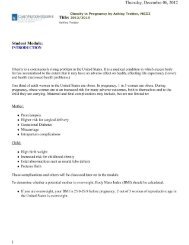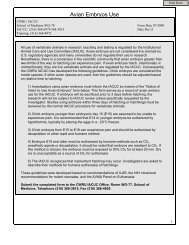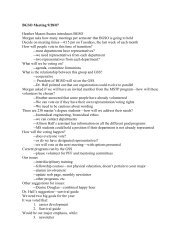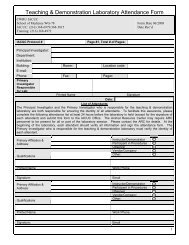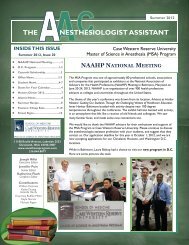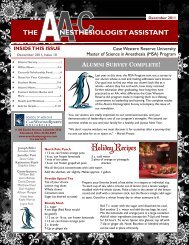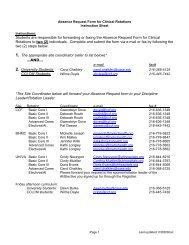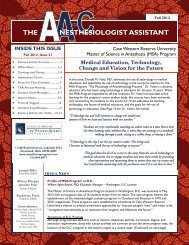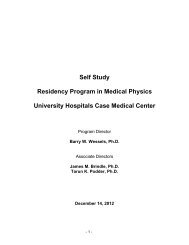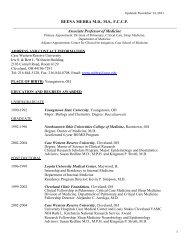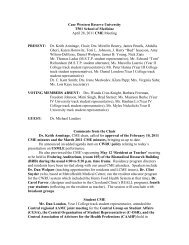Evaluating Academic Job Offers & Negotiating Positions
Evaluating Academic Job Offers & Negotiating Positions
Evaluating Academic Job Offers & Negotiating Positions
Create successful ePaper yourself
Turn your PDF publications into a flip-book with our unique Google optimized e-Paper software.
<strong>Evaluating</strong> <strong>Academic</strong> <strong>Job</strong><br />
<strong>Offers</strong> & <strong>Negotiating</strong><br />
<strong>Positions</strong><br />
Sharon L. Milgram, milgrams@od.nih.gov
Getting An Offer<br />
!! You will typically be asked to provide information regarding<br />
your needs before an offer is made<br />
!! May be verbal first and then in writing<br />
!! Occassionally from HR but typically from the department<br />
chair, etc<br />
!! Is not a done-deal until it is put in writing, the papers are<br />
signed, and all of the paperwork is completed
Your Deliberations Really Boil Down to<br />
!! Quality of the fit<br />
"! Professional and personal<br />
!! Quality of the offer<br />
!! Other offers and options<br />
Three Main Issues:<br />
"! If you are waiting to hear about other positions, email<br />
them with “the good news”
!! BAD FIT - BAD OFFER<br />
With Four Options<br />
!! BAD FIT - GREAT OFFER<br />
!! GREAT FIT - GREAT OFFER<br />
!! GREAT FIT - BAD OFFER
If You Are Not Interested in Pursuing<br />
the Offer<br />
!! Decline as soon as you decide that you are not<br />
interested in talking further<br />
!! Be respectful and keep explanations brief and general<br />
"! I don’t believe there is a good fit for me<br />
"! The balance of clinical duties and research is not what I was<br />
looking for<br />
"! This is not a good move for me [and my family]<br />
"! My partner was unable to find a suitable position<br />
"! I have other offers that provide better opportunities
General Strategy for All Negotiations<br />
!!Prepare<br />
!!Act<br />
!!Respond
Factors To Consider (no special order)<br />
!! The nature of the job<br />
!! Support to establish your research, teaching, and/or<br />
clinical program<br />
!! Salary<br />
!! Benefits<br />
!! Your boss(es)<br />
!! Your co-workers<br />
!! Location & lifestyle
The Nature of the <strong>Job</strong><br />
!! Is it what you want to do?<br />
!! Is it the right balance of teaching, research, clinical<br />
duties, and service?<br />
!! Will it help you achieve your career goals?
Support to Establish Your Research,<br />
Teaching, and/or Clinical Program<br />
!! Will you have access to the right resources?<br />
"! Ample space to do your work<br />
"! Appropriate office space<br />
"! Access to critical equipment and core facilities<br />
!! Will you have access to enough resources?<br />
"! Money<br />
"! Students<br />
"! Clinical samples<br />
"! Teaching assistants and lab prep assistance<br />
!! Will you receive appropriate mentorship and guidance?
Considerations (I)<br />
#! Amount of office and research space<br />
$! Will there be funds for renovations and furniture if needed?<br />
$! Is the layout of the space appropriate?<br />
$! Is your office close to your research group?<br />
$! If wet lab, expect 600 – 1000 sq. ft. of lab space starting out<br />
#! Amount of start-up<br />
$! Generally to cover equipment, supplies, staff, students, travel,<br />
computer support<br />
$! Can be negotiated as a lump sum to use as you wish or with<br />
each category clearly defined<br />
$! Often spread over 2 or three years<br />
$! Expensive equipment may be negotiated separately<br />
$! Your goal is to have enough resources (money, staff and<br />
equipment) to establish and run your program for two years
Considerations (II)<br />
#! Teaching, clinical and/or service responsibilities<br />
$! Optimal if none at first and then increased over time (one year<br />
ramp-up is the norm)<br />
$! How much input will you have as the exact duties are<br />
established?<br />
$! For teaching positions: load, lab vs lecture, repeat classes or<br />
new, ways to “buy out” if research program expands
Understanding the Tenure Process<br />
#! Be clear on the expectations<br />
•! Typically research, teaching, clinical practice and/or service<br />
#! Be clear on the timeline<br />
$! Can you defer or go up early?<br />
#! Be clear on the process<br />
$! First the department, then the School, and then the University<br />
$! Know what they will be asking for<br />
$! Listen to success stories and learn from prior problems<br />
#! Know what tenure means at that institution
When negotiating lead with…<br />
!! In order for me to be productive and do my research I<br />
need…..<br />
!! In order for me to be the best teacher/clinician possible, I<br />
need…<br />
!! And remember<br />
"! Be clear about the difference between needs and<br />
wants<br />
"! Knowledge is power
Salary<br />
!! Is it what you feel you are worth? Or close to it?<br />
!! Is it a 9 month or 12 month appointment?<br />
"! Are you expected to work 12 months regardless?<br />
"! Are there realistic ways to find support for the summer months?<br />
!! Is it a base + bonus system?<br />
!! How much will be you be expected to provide from<br />
grants and when?<br />
"! What happens when faculty don’t meet these<br />
expectations?<br />
"! If you provide more, will some funds be returned to<br />
you for other uses?
!! Find “real-world”data<br />
Knowing Your Value<br />
"! Use more than one on-line database<br />
"! AAMC salary survey for academic positions<br />
"! Many state universities publish salaries of current faculty<br />
"! Use your NIH and university networks<br />
!! Account for geographic area<br />
"! Use two different cost-of-living calculators<br />
"! Factor in personal needs<br />
!! Establish three important numbers:<br />
"! “No go”<br />
"! “Ideal”<br />
"! “Acceptable”
!! Health insurance<br />
"! Types of plans<br />
Benefits (I)<br />
"! Percentage covered by the employer<br />
"! Cost of adding spouse and family<br />
"! Coverage for domestic partners<br />
"! Availability of vision and/or dental plans<br />
!! Other types of insurance<br />
"! Life insurance (basic often provided at no cost)<br />
"! Disability (is often not sufficient)<br />
!! Retirement<br />
"! You need to know the specific vehicles used<br />
"! Time to vest varies<br />
"! Percentage of employer match varies<br />
"! Additional voluntary plans can supplement
!! Vacation and sick leave<br />
Other Benefits (II)<br />
"! Starting amount and rate of increase<br />
"! Paid or unpaid at end of service<br />
!! Holidays<br />
"! Can be as many as 10 paid holidays per year<br />
!! Help with relocation<br />
"! All expenses paid or a moving allowance?<br />
"! Assistance with housing - finding it or paying for it?<br />
"! Help with job for your spouse or partner?
#! Tuition assistance<br />
Other Benefits (III)<br />
"! Specifics vary: job-related only, only at your university, limit to number<br />
per year<br />
"! Some universities also include spouse, partners and children<br />
!! Child care subsidies<br />
"! On or off-site<br />
"! May have waiting lists and salary guidelines<br />
!! Bonuses<br />
"! At signing, annual, on-the-spot, or a combination?<br />
"! Much more common in government and private sector<br />
!! Paid sabbaticals
Multiple <strong>Offers</strong><br />
#! Be clear and willing to share information with all parties<br />
#! Know timelines for each and appreciate that they may<br />
differ<br />
#! You can ask for more time to decide, but you may not<br />
get it
!! Stall<br />
"! Express enthusiasm; ask for time to carefully consider the offer<br />
"! Factor in other “irons in the fire”<br />
"! Take time to prepare for any negotiation you decide is important<br />
!! Accept<br />
"! Not before you have an offer in writing; accept in writing<br />
"! Address start dates or any previously planned commitments up-front<br />
"! You must then reject other offers and withdraw other applications<br />
!! Reject<br />
Three Responses to Any Offer<br />
"! Respectfully - no need to burn bridges<br />
"! Be prepared to explain why
Prepare<br />
!! Research what a typical offer looks like<br />
"! Generally and at the specific institution<br />
!! Clearly distinguish your WANTS and your NEEDS<br />
!! Consider your reasons for asking for more money, space,<br />
resources, etc.<br />
!! Consider your boss’ perspective<br />
!! Consider possible questions and responses you may hear<br />
during the negotiation<br />
!! Practice; confirm that you sound professional and<br />
courteous (verbally or in writing)<br />
"! Take advantage of IC and OITE resources
Act<br />
!! Start by conveying your enthusiasm for the position and<br />
summarize elements of the offer that you find acceptable<br />
!! Introduce the area you would like to negotiate about<br />
!! Listen carefully to the response; ask for clarification if<br />
needed<br />
!! Take notes; stress may make it difficult to remember what<br />
was said<br />
!! Restate positions and agreements<br />
!! End with a thank you and some indication of your level of<br />
enthusiasm
!! Talking is often better than writing<br />
!! Start with a thank you for their consideration<br />
!! Get to the point quickly<br />
"! Make a counter-offer<br />
"! accept<br />
"! reject<br />
!! Be gracious - in victory or defeat<br />
!! Finalize in writing<br />
Respond
<strong>Negotiating</strong> Salary: Be prepared for<br />
these responses<br />
!! What salary are you willing to work for?<br />
"! Best to put your optimal salary in the mid-range of the scale<br />
!! If I pay you what you are asking for, you will earn more<br />
than other recent hires<br />
!! I don’t have any flexibility in this regard - salary ranges<br />
are set by my boss, HR, the college, etc.<br />
!! We are offering all of our new hires the same nonnegotiable<br />
salary



